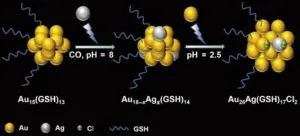(Press-News.org) Globally 2023 was the warmest year in a series stretching back to 1850, according to figures released today by the Met Office and the University of East Anglia.
2023 is the tenth year in succession that has equalled or exceeded 1.0 °C above the pre-industrial period (1850-1900).
The global average temperature for 2023 was 1.46 °C above the pre-industrial baseline; 0.17 °C warmer than the value for 2016, the previous warmest year on record in the HadCRUT5 global temperature dataset which runs from 1850.
Dr Colin Morice is a Climate Monitoring and Research Scientist with the Met Office. He said:
“2023 is now confirmed as the warmest year on average over the globe in 174-years of observation. 2023 also set a series of monthly records, monthly global average temperatures having remained at record levels since June. Ocean surface temperatures have remained at record levels since April.
“Year-to-year variations sit on a background of around 1.25 °C warming in global average temperatures above pre-industrial levels. This warming is attributable to human-induced climate change through greenhouse gas emissions.”
On top of the long-term warming, a transition into El Niño conditions contributed to further elevated temperatures for the latter part of the year. El Niño is part of a pattern of climate variability in the tropical Pacific that imparts warmth to the global atmosphere, temporarily adding up to 0.2 °C to the temperature of an individual year. This stands in contrast to the reverse pattern of climate variability, La Niña, which suppressed global average temperatures in 2021 and 2022.
Outlook for 2024
Professor Adam Scaife is a Principal Fellow and Head of Monthly to Decadal Prediction at the Met Office. He said: “It is striking that the temperature record for 2023 has broken the previous record set in 2016 by so much because the main effect of the current El Niño will come in 2024. Consistent with this, the Met Office’s 2024 temperature forecast shows this year has strong potential to be another record-breaking year.”
The Met Office global temperature for 2024 is forecast to be between 1.34 °C and 1.58 °C (with a central estimate of 1.46 °C) above the average for the pre-industrial period (1850-1900): the 11th year in succession that temperatures will have reached at least 1.0 °C above pre-industrial levels.
HadCRUT5
The HadCRUT5 dataset is compiled by the Met Office and the University of East Anglia (UEA), with support from the National Centre for Atmospheric Science. It shows that when compared with the pre-industrial reference period, 2023 was 1.46 ± 0.1 °C above the 1850-1900 average. This aligns extremely well with figures published today by other international centres.
Professor Tim Osborn, of the University of East Anglia’s Climatic Research Unit, said: “Twenty-five years ago, 1998 was a record-breaking year for global average temperature. But last year’s global temperature was 0.5 °C warmer than 1998, providing further evidence that our planet is warming on average by 0.2 °C per decade.
“At the current rate of human-induced warming, 2023’s record-breaking values will in time be considered to be cool in comparison with what projections of our future climate suggest.”
Other data sets
The World Meteorological Organization uses six international data sets to provide an authoritative assessment of global temperature change. They report 2023 was around 1.45 ± 0.12°C warmer than the 1850-1900 baseline based on an average of the six data sets.
The long-term warming is clear. Since the 1980s, each decade has been warmer than the previous one.
Importance of global mean temperature
Global average temperature is the key measure of climate change, providing a headline metric that is expanded upon by the changing patterns of rainfall, drought, ice, temperature and extreme weather that are associated with a warming climate. You can see the impact on other key climate indicators on the Met Office global climate dashboard.
It is complex and challenging to track the average temperature of an entire planet, using around a billion temperature observations from the last 174 years.
The UK’s contribution to measuring this key indicator of climate change is led by scientists at the Met Office, UEA and NCAS. This ongoing work is crucial as the world moves still closer to the limits set out in the Paris Agreement
Prof Philip Jones, Professorial Fellow at UEA’s Climatic Research Unit, said: “I've been working with the global temperature series since the early 1980s. There has never been a year like 2023 where the warmest-ever June, warmest-ever July through to the warmest-ever December was recorded for seven months in a row, from June to December, 2023.”
Defining global temperature change relevant to the Paris Agreement
While the global average temperature in a particular year is well-known, this will not be suitable as an indicator of whether the “Paris 1.5” has been breached or not, because the Paris Agreement refers to long-term warming, not individual years. But no alternative has yet been formally agreed.
In a recent paper published in Nature, Met Office scientist Prof Richard Betts and coauthors proposed an indicator combining the last ten years of global temperature observations with an estimate of the projection or forecast for the next ten years. If adopted by the international community this could mean a universally agreed measure of global warming that could trigger immediate action to avoid further rises.
Using this suggested approach, the researchers found that the figure for the current global warming level, relevant to the Paris Agreement, is around 1.26 °C, with an uncertainty range of 1.13 °C to 1.43 °C.
This graphic shows the annual global temperature anomaly for 2023 compared to a 1961-1990 averaging period. The global average temperature for 2023 was 1.46 °C above the pre-industrial baseline according to the HadCRUT5 data set. This map uses HadCRUT5 data, compiled by the Met Office and the University of East Anglia, with support from the National Centre for Atmospheric Science.
[An animated monthly version of this graphic is available here]
END
2023: the warmest year on record globally
2024-01-12
ELSE PRESS RELEASES FROM THIS DATE:
Researchers develop technique to synthesize water-soluble alloy nanoclusters
2024-01-12
In recent years, ultrasmall metal nanoclusters have unlocked advances in fields ranging from bioimaging and biosensing to biotherapy thanks to their unique molecular-like properties. In a study published in the journal Polyoxometalates on December 11, 2023, a research team from Qingdao University of Science and Technology proposed a design to synthesize atomically precise, water-soluble alloy nanoclusters.
“The novelty of this study is in a new strategy for the synthesis of water-soluble alloy nanoclusters and a further contribution ...
Clinical predictive models created by AI are accurate but study-specific
2024-01-12
In a recent study, scientists have been investigating the accuracy of AI models that predict whether people with schizophrenia will respond to antipsychotic medication. Statistical models from the field of artificial intelligence (AI) have great potential to improve decision-making related to medical treatment. However, data from medical treatment that can be used for training these models are not only rare, but also expensive. Therefore, the predictive accuracy of statistical models has so far only been demonstrated in a few ...
$900,000 awarded to optimize graphene energy harvesting devices
2024-01-12
U of A physics professor Paul Thibado received a commitment of $904,000 from the WoodNext Foundation, administered by the Greater Houston Community Foundation. The five-year grant will support Thibado’s development of graphene energy harvesters.
“We have successfully developed a process for building graphene energy harvesting device structures,” Thibado said, “but current structures do not harvest enough power. This proposal will allow us to optimize these structures to harvest nanowatts of power, which is enough energy to run sensors.”
Thibado and his colleagues will develop graphene energy harvesting ...
Kessler Foundation scientist awarded prestigious federal grant for novel, mixed-method study on Latinos with multiple sclerosis
2024-01-12
East Hanover, NJ – January 12, 2024 – A research scientist at Kessler Foundation has been awarded a highly competitive Mentored Patient-Oriented Research Career Development Award (K23) from the National Institute on Minority Health and Health Disparities, a part of the National Institutes of Health (NIH).
This $704,054, five-year grant will support one of the first mixed-methods studies aimed at examining barriers to healthcare, cardiovascular risk factors, and accelerated brain aging in Latinos with multiple sclerosis (MS). The Principal Investigator and grant recipient, Cristina A. F. Román, PhD, is currently a research ...
Stress, via inflammation, is linked to metabolic syndrome
2024-01-12
COLUMBUS, Ohio – Lifestyle and genetics, and a range of other factors within and outside our control, are known to contribute to development of metabolic syndrome, a cluster of conditions that add up to increased risk for serious health problems.
A new study has found that stress, through its propensity to drive up inflammation in the body, is also linked to metabolic syndrome – leading researchers to suggest that cheap and relatively easy stress-management techniques may be one way to help improve biological health outcomes.
“We were specifically examining people in midlife – ...
NIH awards education grant for Weill Cornell Medicine’s first post-baccalaureate research program
2024-01-12
The National Institute of General Medical Sciences of the National Institutes of Health has awarded Weill Cornell Medicine a $1.8 million five-year grant to fund a new post-baccalaureate research education program that aims to cultivate scientists and physician-scientists who hail from groups traditionally underrepresented in science and medicine.
Advancing Success and Persistence in Research Education, or ASPiRE, will support college graduates who hope to attend professional and graduate school. The program will train four scholars each year for the first three years, and five scholars in years four and five. The program’s duration is designed to be flexible to the ...
Want safer prescribing? Provide doctors with a plan for helping patients in pain
2024-01-12
Physicians who are notified that a patient has died of a drug overdose are more judicious in issuing controlled substances if the notification includes a plan for what to do during subsequent patient visits, according to a study published today in Nature Communications.
Compared to a letter with demonstrated effectiveness at improving prescribing safety, physicians who received notifications with additional planning guidance reduced prescriptions of opioids by nearly 13%. They also reduced prescriptions of the anxiety medications benzodiazepines and by more than 8%. Together these drugs constitute the bulk of prescription drug overdoses.
The results suggest that the guidance, known ...
Study uncovers potential origins of life in ancient hot springs
2024-01-12
Newcastle University research turns to ancient hot springs to explore the origins of life on Earth.
The research team, funded by the UK’s Natural Environmental Research Council, investigated how the emergence of the first living systems from inert geological materials happened on the Earth, more than 3.5 billion years ago. Scientists at Newcastle University found that by mixing hydrogen, bicarbonate, and iron-rich magnetite under conditions mimicking relatively mild hydrothermal vent results in the formation of a spectrum of organic molecules, most notably including ...
Nutritional acquired immunodeficiency (N-AIDS) is the leading driver of the TB pandemic
2024-01-12
(Boston)—Tuberculosis (TB) is the leading infectious killer worldwide, with 10.6 million cases and 1.6 million deaths in 2021 alone. One in five incident TB cases were attributable to malnutrition, more than double the number attributed to HIV/AIDS. Like HIV/AIDS, malnutrition is a cause of secondary immunodeficiency, known as nutritionally acquired immunodeficiency syndrome (N-AIDS). However, N-AIDS remains the neglected cousin of HIV/AIDS in global TB elimination efforts.
In a review paper led by Madolyn Dauphinais, MPH, researchers at Boston University Chobanian ...
Obesity linked to detection of blood cancer precursor
2024-01-12
(WASHINGTON, January 12, 2024) – Individuals with obesity are more likely to have monoclonal gammopathy of undetermined significance (MGUS), a benign blood condition that often precedes multiple myeloma, according to new research published in Blood Advances.
Multiple myeloma is a blood cancer of the plasma cells, a type of white blood cells that produce antibodies to fight infection. MGUS, characterized by an abnormal protein produced by plasma cells, is a known precursor to multiple myeloma. Most people with MGUS exhibit no significant symptoms and are not immediately ill. Rather, the presence of MGUS serves as a warning to monitor for the potential ...


